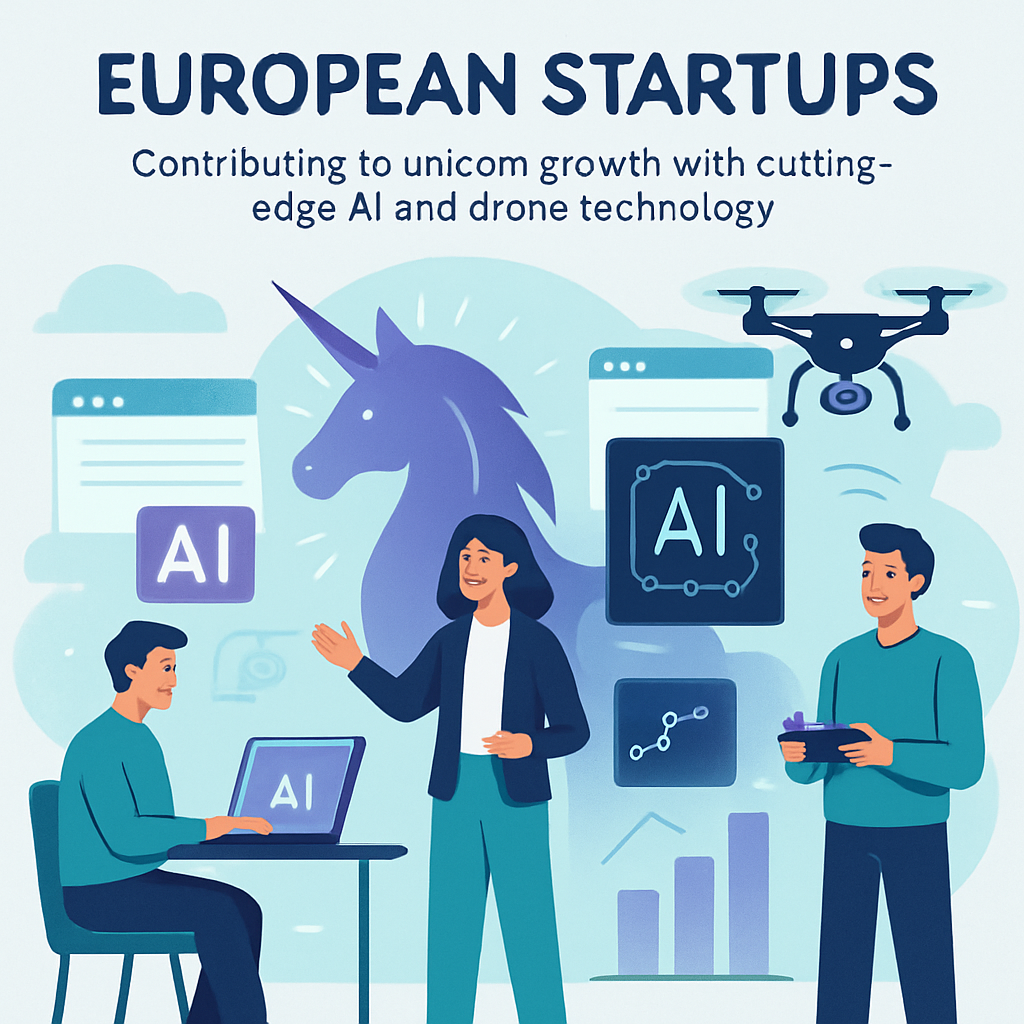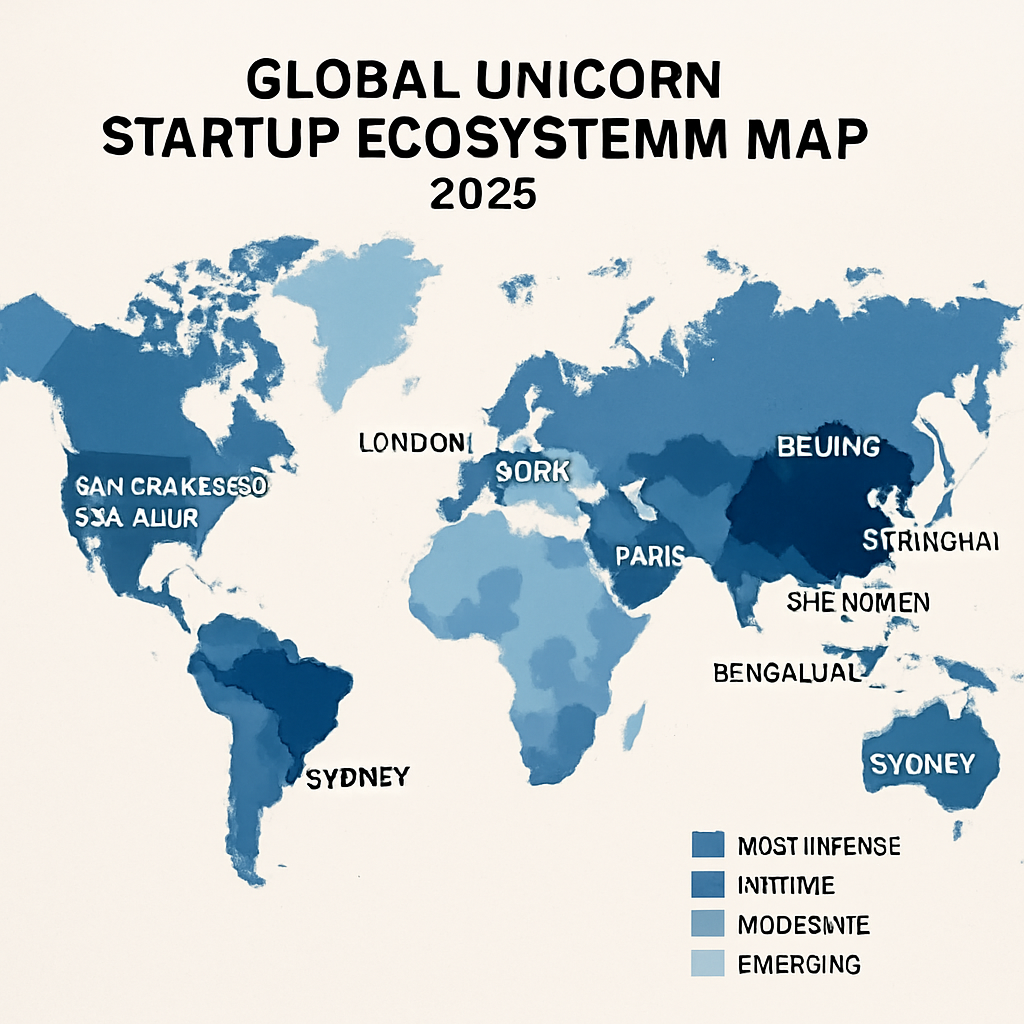May 2025 proved to be a landmark month for the global startup ecosystem, witnessing a remarkable surge in unicorn valuations with thirteen new companies entering the exclusive billion-dollar valuation club. Notably, five of these newly minted unicorns hail from Europe, the highest monthly addition since 2023, underscoring the continent’s maturing venture capital landscape and innovation capacity. Together, these startups increased the collective valuation of unicorn companies by approximately $21.7 billion in just one month, signaling an uptrend in entrepreneurship and investment appetite amid ongoing technological disruption.
The confluence of advances in AI, defense tech, and e-commerce has spurred considerable innovation and attracted hefty funding rounds. Not only did the United States contribute six new unicorns, representing dominant players in sales, marketing, and health technology sectors, but India also added to the momentum with two startups joining the unicorn board, reflecting growing global competition and investor interest. This expansion contrasts with the six companies that exited the board during the same period either via IPOs or acquisitions, a natural churning that reshapes the market and presents opportunities for fresh entrants.
Delving into the European scene, the country-specific milestones are striking. Germany celebrated two first-time unicorns contributing to its burgeoning tech ecosystem, Portugal welcomed its inaugural billion-dollar startup this year, and the UK maintained steady momentum by adding two more companies this May. These European startups exemplify the successful synergy between cutting-edge technology, strategic funding, and visionary entrepreneurship, which are driving cross-sector innovation and economic growth amid global market uncertainties.
As startups worldwide harness AI-driven platforms, enhanced customer engagement tools, and new defense mechanisms, venture capitalists are keeping a close eye on these disruptive businesses capable of reshaping industries. The intricate dance of valuation, investment, exit strategies, and scaling defines the path forward for unicorns and their backers in 2025.
Explosive Growth of European Unicorns: Catalysts and Challenges in the Emerging Landscape
The European startup scene has entered an exhilarating phase of rapid growth and valuation expansion in 2025. The addition of five new unicorns in May alone stands as a testament to the continent’s increasing capability to foster innovation-led entrepreneurship, especially in sectors from defense technology to AI-enabled sales and marketing tools. This milestone is the highest single-month surge in unicorn creation on the continent since 2023, illustrating a robust appetite for venture capital investment and market expansion in Europe’s tech hubs.
Europe’s unicorn milestone encompasses breakthroughs from unexpected quarters. Notably, Germany and Portugal each celebrated historic firsts with the emergence of their first billion-dollar tech startups this year. Berlin and Bayern fuel this momentum with startups like Parloa, an automated customer interaction platform, and Quantum Systems, a manufacturer of unmanned drones geared for defense applications. These companies highlight a trend towards cutting-edge dual-use technologies designed to address both civilian and military needs—a sector increasingly buoyed by geopolitical needs and emerging defense budgets.
Simultaneously, the UK ecosystem strengthened its footprint by welcoming two new unicorns, further consolidating its reputation as a dynamic hub for SaaS, media, and streaming enterprises, exemplified by companies like Mubi expanding indie streaming globally. The continent’s venture capital landscape has demonstrated a significant uptick in deal flow, underwriting innovation that stretches from ecommerce and logistics to biopharma and cybersecurity. Yet, despite this flourishing environment, these startups continue to face challenges including navigating complex regulatory frameworks, securing sustained investment in a tightening global economic climate, and competing against the expansive scale of U.S. tech giants.
Highlights of European Unicorn Milestones in May 2025:
- Five new unicorns, the highest monthly total since 2023.
- Germany’s first two unicorns this year: Parloa and Quantum Systems.
- Portugal’s maiden unicorn of 2025: Tekever, specializing in unmanned aerial surveillance.
- UK extends its unicorn count with two companies, including the indie streaming platform Mubi.
- Multiple sectors represented: defense tech, AI-driven sales & marketing, SaaS, and media.
For entrepreneurs and investors looking to understand this momentum, it is critical to analyze sector-specific trends and the direct impact of AI technology and digital transformation on these companies. Startups such as Parloa and Tekever showcase how integrating advanced AI and drone technologies not only disrupts traditional markets but also unlocks new investment avenues.
| Startup | Country | Sector | Valuation | Recent Funding |
|---|---|---|---|---|
| Parloa | Germany | Sales & Marketing (AI Automation) | $1 Billion | Series C – $120 Million |
| Quantum Systems | Germany | Defense Tech (Unmanned Drones) | $1 Billion | Series C – $181 Million |
| Tekever | Portugal | Defense Tech (Surveillance Systems) | $1.3 Billion | Undisclosed |
| Mubi | UK | Media & Entertainment (Streaming) | $1 Billion | $100 Million Funding |
| Wireless Logic | UK | DevOps / IoT Management | $4.65 Billion | Minority Investment |
Each firm reflects a distinct narrative of innovation intersecting with market forces and capital injection, demonstrating the drive behind Europe’s rising stature on the global stage of tech companies and unicorns. The effort to navigate investment landscapes is apparent in the diverse funding sources, ranging from traditional venture capital to family offices and private equity.

Sectoral Leadership Among New Unicorns: AI, Defense Tech, and E-commerce Revolution
The composition of the new unicorn cohort in May 2025 reflects the compelling influence of artificial intelligence, defense innovation, and digital commerce in shaping present-day entrepreneurship. Startup sectors such as sales and marketing technology, software automation, and defense tech emerged as leaders in fostering unicorn valuations, attesting to the transformative power of venture capital investment in these domains.
Among the thirteen new unicorns, firms in sales and marketing accounted for two significant additions: Liftoff, a seasoned California-based marketing solution focusing on app user growth and engagement, and Parloa, a young German company revolutionizing customer interaction through AI-driven automation. These companies exemplify how innovation in customer acquisition and experience continues to be a fertile ground for investment and valuation growth.
The defense sector notably contributed two companies to the unicorn list, underlining the rising importance of advanced technologies in surveillance and unmanned aerial systems. Tekever from Portugal, known for its unmanned surveillance systems actively utilized in conflict zones such as Ukraine, achieved a $1.3 billion valuation through undisclosed funding rounds. Meanwhile, Quantum Systems from Bavaria has raised substantial capital, led by Balderton Capital, to develop dual-use unmanned drones catering to both military and commercial markets.
E-commerce and product tool startups also expanded the unicorn club. SpreeAI, offering photorealistic try-on technology for fashion, raised undisclosed funding elevating its valuation to $1.5 billion, demonstrating sustainable innovation in retail tech. Statsig, a product development platform based in Bellevue, Washington, secured a $100 million Series C round, reaching a $1.1 billion valuation by leveraging data-driven experimentation. These companies highlight the disruptive potential of AI and digital innovation across borders and sectors.
Key highlights by sector in May’s unicorn surge:
- Sales and Marketing: Liftoff ($4.3B valuation; acquired by Blackstone in 2020) and Parloa ($1B valuation).
- Defense Tech: Tekever ($1.3B valuation) and Quantum Systems ($1B valuation).
- DevOps & IoT: Wireless Logic, valued at $4.65B after a minority investment led by Beyond Net Zero.
- Biotechnology: Pathos, an AI oncology drug developer, valued at $1.6B following Series D.
- E-commerce Innovation: SpreeAI ($1.5B valuation) and Porter, last-mile delivery startup from India, valued at $1.2B.
- Product Tools and HR SaaS: Statsig and Awardco, with valuations surpassing $1B.
| Sector | Company | Valuation | Funding Highlight |
|---|---|---|---|
| Sales & Marketing | Liftoff | $4.3 Billion | General Atlantic investment |
| Defense Tech | Tekever | $1.3 Billion | Undisclosed funding |
| E-commerce | Porter | $1.2 Billion | Series F – $200 Million |
| Biotechnology | Pathos | $1.6 Billion | Series D – $365 Million |
| Product Tools | Statsig | $1.1 Billion | Series C – $100 Million |
The convergence of venture capital interest in these companies signals a broader industry pattern – investors are prioritizing startups capable of integrating AI with practical applications, from digital marketing to complex defense solutions. This implies an ongoing pivot in how innovation is funded and scaled, aligning capital allocation more closely with future market demands and technological growth.
This focus on sectors driven by AI and digital transformation is well aligned with broader industry insights reported earlier in the year that highlight the scaling and struggles of AI-powered firms globally, providing a relevant backdrop for understanding these new unicorns’ trajectories: Unlocking Unicorn Potential in AI.
Venture Capital and Funding Dynamics Driving Unicorn Valuations in 2025
The recent surge in unicorn valuations owes much to strategic funding rounds, insightful leadership, and a growing investor appetite for companies that exemplify disruption and scalable innovation. In May, thirteen companies achieved unicorn status with a combined valuation impact of nearly $22 billion. This influx of capital marks a key moment, reflecting global investors’ confidence in startups’ abilities to harness technology and develop new market paradigms.
Key to this wave has been the targeted involvement of venture capital funds specialized in sectors such as AI, biotech, and defense tech, as well as private equity firms expanding into high-growth startups. For example, General Atlantic has been pivotal in backing growth-stage companies like Liftoff and Wireless Logic, demonstrating the importance of experienced venture capital partners in guiding startups beyond early-stage success.
Investment figures from funding rounds illustrate the robust flow of capital:
- Liftoff’s valuation adjustment following undisclosed Series funding shows the sustained value of mature startups navigating evolving marketing landscapes.
- Tekever’s $1.3 billion valuation, despite undisclosed capital injections, underscores strategic backing’s role in defense technology scaling.
- The $365 million Series D raised by Pathos reflects investor confidence in AI-driven biotechnology breakthroughs poised to transform oncology drug development.
- Porter’s $200 million Series F led by Kedaara Capital exemplifies a growing interest in logistics solutions adapting to last-mile delivery demands in India and globally.
- Parloa’s $120 million Series C is a strong indicator of funding scales fueling AI-driven automation businesses within European tech hubs.
Moreover, the financial exits through IPOs and acquisitions during the month shed light on market dynamics shifting valuation benchmarks. Notable was the acquisition of Windsurf, a coding-focused AI startup, by OpenAI at thrice its last valuation from 2024, highlighting how strategic investors can escalate company values dramatically through targeted technology integration and positioning (AI startups coding valuation).
| Company | Funding Round | Valuation | Investor/Acquirer | Remarks |
|---|---|---|---|---|
| Windsurf | Acquisition | $3 Billion | OpenAI | 3x valuation increase since 2024 |
| Pathos | Series D | $1.6 Billion | Undisclosed | AI Oncological drug development |
| Porter | Series F | $1.2 Billion | Kedaara Capital, Wellington Management | Last-mile delivery innovation in India |
| Parloa | Series C | $1 Billion | Altimeter Capital, General Catalyst | AI automation for customer interactions |
| Liftoff | Undisclosed | $4.3 Billion | General Atlantic | App growth marketing solutions |
These examples emphasize that securing robust funding and strategic partnerships is crucial for startups aiming to scale their valuation and footprint effectively. Entrepreneurial success continues to hinge on balancing technology innovation with pragmatic financial strategies. Industry observers consistently highlight the importance of evaluating startup risks and growth potential wisely, especially in sectors characterized by rapid AI-driven transformation (Startup advises hold funds).
The Role of Exits in Unicorn Market Dynamics: IPOs, Acquisitions, and Market Valuation Adjustments
The unicorn board’s churn in May 2025 also brought important shifts through six exit events that cumulatively removed $13.4 billion from the board’s valuation statistics. Four companies went public while two were acquired, signaling significant liquidity events for investors and redirecting market focus.
The four IPOs offer insights into how different markets recognize and price emerging technology firms:
- eToro, the Israeli social trading platform, made its market debut at or above its last valuation, indicating sustained investor confidence in fintech innovation.
- Hinge Health from San Francisco saw a valuation adjustment post-IPO, debuting at $2.6 billion, substantially below its prior $6.2 billion valuation—highlighting valuation corrections upon transitioning to public markets.
- India’s Ather Energy, a manufacturer of electric scooters, achieved a public offering valuing it in line with private market estimates, reflecting strong consumer trends in sustainable mobility.
- MNTN, an Austin-based advertising platform, went public maintaining valuation strengths suitable for sectors tied to digital marketing and data-driven customer engagement.
Acquisitions such as OpenAI’s purchase of Windsurf at $3 billion and Chobani’s acquisition of Daily Harvest represent strategic bets on AI coding and direct-to-consumer brands, respectively. Windsurf’s acquisition followed a dramatic valuation increase since 2024, indicating the premium placed on AI startups integral to software development and automation landscape evolution.
| Exited Company | Exit Type | Exit Valuation | Sector | Comments |
|---|---|---|---|---|
| eToro | IPO | At/above prior valuation | Fintech | Strong debut in public markets |
| Hinge Health | IPO | $2.6 Billion | Digital Health | Downward adjustment from $6.2B private valuation |
| Ather Energy | IPO | In line with private valuation | Electric Mobility | Reflects green mobility market growth |
| MNTN | IPO | Maintained private valuation | Digital Advertising | Data-driven marketing strength |
| Windsurf | Acquisition | $3 Billion | Coding AI | Acquired by OpenAI |
| Daily Harvest | Acquisition | Undisclosed | Direct to Consumer Food | Acquired by Chobani |
Market observers note that exit performance often sets the tone for investor expectations and startup trajectories. The adjustment seen in companies like Hinge Health underscores the variability between private funding valuations and public market realities. Meanwhile, high-profile acquisitions reveal corporate strategies pivoting towards innovation embedded in AI and consumer branding, shaping evolving unicorn profiles through mergers and acquisitions (Drools unicorn Nestle investment).
Global Unicorn Ecosystem Trends and Regional Entrepreneurship Dynamics in 2025
Worldwide, the startup landscape continues to reflect regional nuances along with universal drivers of entrepreneurship, such as advancing technology, venture capital availability, and evolving business models. The addition of 13 new unicorns in May 2025 spread across multiple continents signifies a vibrant yet competitive ecosystem that embraces disruption while grappling with local challenges.
The United States sustained the highest tally of new unicorns, contributing six startups this month and totaling 31 year-to-date. This dominance stems from a deeply established venture capital network, a culture of bold entrepreneurship, and an ability to scale technology firms rapidly across diverse sectors including health tech, SaaS, and logistics. Meanwhile, India, despite adding just two new unicorns this May, is attracting increasing investment interest in logistics and e-commerce platforms such as Porter, thereby holding an important regional niche.
The European cohort’s rise coincides with broader initiatives to empower tech entrepreneurship across the continent, supported by improved policy frameworks and access to capital. Yet, the startup community faces hurdles like regulatory complexity and scale competition from U.S. and Chinese giants. Diverse sectors like biotechnology (Pathos), SaaS (Owner), and media streaming (Mubi) illustrate the widening breadth of innovation fields gaining traction in various markets.
- U.S.: 31 new unicorns in 2025, with strong biotech and SaaS presence.
- Europe: 5 new unicorns in May, with German and Portuguese market breakthroughs.
- India: 3 unicorns in 2025 so far, led by logistics and consumer startups.
- Emerging tech areas: AI, defense, digital health, e-commerce.
- Exits and acquisitions continue to reshape capital flows and valuations.
| Region | New Unicorn Count in May | Year-to-Date 2025 | Leading Sectors |
|---|---|---|---|
| United States | 6 | 31 | Health Tech, SaaS, Logistics |
| Europe | 5 | NA | Defense Tech, AI Automation, Media Streaming |
| India | 2 | 3 | E-commerce, Logistics |
This evolving global ecosystem fuels rich opportunities as well as competitive pressure among startups and investors. Entrepreneurs are increasingly encouraged to foster cross-border partnerships and embrace cutting-edge technologies to navigate the challenges of scale, valuation, and innovation. The regional spotlight on prominent sectors offers a roadmap for venture capital strategies that balance risk and growth potential (Unicorn 100 India slowdown).

FAQ about New Unicorns and Startup Valuations in 2025
- Q: What defines a unicorn company?
A unicorn is a privately held startup company valued at over $1 billion, typically identified through significant funding rounds or secondary market valuations.
- Q: Why are European tech companies gaining more unicorn status in 2025?
Europe’s increasing unicorn numbers reflect enhanced venture capital activity, government support, and an expanding entrepreneurial ecosystem particularly in AI, defense, and SaaS sectors.
- Q: How do AI advancements influence unicorn valuations?
AI-powered innovations enable startups to offer disruptive solutions across multiple sectors, attracting larger investments and accelerated valuation growth.
- Q: What role do IPOs and acquisitions play in the unicorn market?
Exits through IPOs and acquisitions are vital for capital recycling, valuation adjustments, and creating new investment opportunities for emerging startups.
- Q: How important is venture capital for startup success?
Venture capital provides the essential funding and strategic guidance necessary for startups to innovate, scale rapidly, and compete in global markets.


